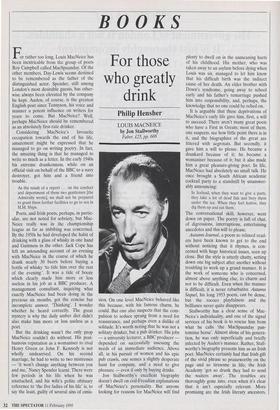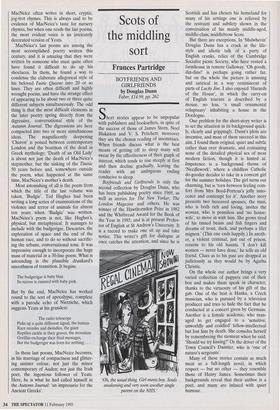BOOKS
For those who greatly drink
Philip Hensher
LOUIS MACNEICE by Jon Stallworthy Faber, £25, pp. 608 For rather too long, Louis MacNeice has been inextricable from the group of poets Roy Campbell called MacSpaunday. Of the other members, Day-Lewis seems destined to be remembered as the father of the distinguished actor. Spender, still among London's most desirable guests, has other- wise always been elevated by the company he kept. Auden, of course, is the greatest English poet since Tennyson, his voice and manner a potent influence on writers for years to come. But MacNeice? Well, perhaps MacNeice should be remembered as an absolutely first-rate drinker.
Considering MacNeice's favourite occupation towards the end of his life, amazement might be expressed that he managed to go on writing poetry. In fact, the amazing thing is that he managed to write so much as a letter. In the early 1940s his extreme drunkenness, while on an official visit on behalf of the BBC to a navy destroyer, got him and a friend into trouble.
As the result of a report . . . on the conduct and deportment of these two gentlemen [the Admiralty wrote], we shall not be prepared to grant them further facilities to go to sea in H.M. Ships.
Poets, and Irish poets, perhaps, in partic- ular, are not noted for sobriety, but Mac- Neice really was in the championship league as far as imbibing was concerned. By the 1950s he had developed the habit of drinking with a glass of whisky in one hand and Guinness in the other. Jack Cope has left an astounding account of an evening with MacNeice in the course of which he drank nearly 30 beers before buying a bottle of whisky `to tide him over the rest of the evening '. It was a tide of booze which clearly made him more or less useless in his job as a BBC producer. A management consultant, inquiring what exactly MacNeice had been doing in the previous six months, got the concise but incomplete answer, 'Thinking'. I wonder whether he heard correctly. The great mystery is why the daily amber diet didn't also make him more or less useless as a poet.
But the drinking wasn't the only prop MacNeice couldn't do without. His post- humous reputation as a womaniser to rival Henry Green or John F. Kennedy is not wholly undeserved. On his second marriage, he had to write to two mistresses — 'it won't change anything between you and me,' Nancy Spender learnt. There were few periods in his life when he was unattached, and his wife's polite obituary reference to 'the five ladies of his life' is, to say the least, guilty of several sins of omis- sion. On one level MacNeice behaved like this because, with his famous charm, he could. But one also suspects that the com- pulsion to seduce sprang from a need for reassurance, and perhaps even a dislike of solitude. It's worth noting that he was not a solitary drinker, but a pub drinker. His jobs — a university lecturer, a BBC producer depended on successfully assessing the needs of an immediate audience. Above all, in his pursuit of women and his epic pub crawls, one senses a slightly desperate hunt for company, and a need to give pleasure — even if only by buying drinks, Jon Stallworthy's excellent biography doesn't dwell on cod-Freudian explanations of MacNeice's personality. But anyone looking for reasons for MacNeice will find plenty to dwell on in the unmeaning hurts of his childhood. His mother, who was taken away to an asylum before dying when Louis was six, managed to let him know that his difficult birth was the indirect cause of her death. An elder brother with Down's syndrome, going away to school early and his father's remarriage pushed him into responsibility, and, perhaps, the knowledge that no one could be relied on.
It is arguable that these deprivations of MacNeice's early life gave him, first, a will to succeed. There aren't many great poets who have a First in Greats; most of them, one suspects, see how little point there is in it, and the biographies of the great are littered with aegrotats. But secondly, it gave him a will to please. He became a drunkard because of it; he became a womaniser because of it; but it also made him a great pleasure-giving poet. In life, MacNeice had absolutely no small talk. He once brought a South African academic cocktail party to a standstill by unanswer- ably announcing:
In Iceland, when they want to give a party, they take a lot of dead fish and bury them under the ice. When they feel festive, they dig them up and eat them.
The conversational skill, however, went down on paper. The poetry is full of chat, of digressions, interruptions, entertaining anecdotes and this will to please.
Autumn Journal, a poem so relaxed read- ers have been known to get to the end without noticing that it rhymes, is con- cerned with huge historical issues, seen up close. But the style is utterly chatty, setting down one big subject after another without troubling to work up a grand manner. It is the work of someone who is concerned, almost above anything else, to charm and not to be difficult. Even when the manner is difficult, it is never rebarbative. Autumn Sequel, his long 1953 poem, can be dense, but the rococo playfulness and the brilliance never quite disappears.
Stallworthy has a clear sense of Mac- Neice's individuality, and one of the signal services of his book is to rescue him from what he calls 'the MacSpaunday pan- tomime horse'. Almost alone of his genera- tion, he was only superficially and briefly infected by Auden's manner. Rather, Stall- worthy's biography presents him as an Irish poet. MacNeice certainly had that Irish gift of the vivid phrase so praiseworthy on the page and so tiresome in life; the Irish Academy 'got so drunk they had to send the waiters away'. The troubles are thoroughly gone into, even when it's clear that it isn't especially relevant. More promising are the Irish literary ancestors. MacNeice often writes in short, cryptic, jog-trot rhymes. This is always said to be evidence of MacNeice's taste for nursery rhymes, but when one reads the last poems, the most evident voice is an intricately decorated version of Yeats.
MacNeice's last poems are among the most accomplished poetry written this century, and it is amazing that they were written by someone who must quite often have found it difficult to do up his shoelaces. In them, he found a way to condense the elaborate allegorical style of his beloved Fairie Queene into 20 or so lines. They are often difficult and highly wrought poems, and have the strange effect of appearing to be about two or three quite different subjects simultaneously. The odd thing is that the most difficult elements in the later poetry spring directly from the digressive, conversational style of the Autumn Journal. The digressions are here compacted into two or more simultaneous ideas. The magnificently deepening `Charon' is poised between contemporary London and the boatman of the dead in Greek mythology; 'Death of an Old Lady' is about not just the death of MacNeice's stepmother, but the sinking of the Titanic 50 years before and, somewhere outside the poem, what happened at the same time, MacNeice's mother's death.
Most astonishing of all is the poem from which the title of the last volume was taken, 'Budgie'. Ted Hughes had been writing a long series of examinations of the violence and terror of animals for almost ten years when 'Budgie' was written. MacNeice's poem is not, like Hughes's, physical, but metaphysical. It manages to include with the budgerigar, Descartes, the exploration of space and the end of the human race, and to do so without sacrific- ing the urbane, conversational tone. It was impressive enough to incorporate the huge mass of material in a 30-line poem. What is astounding is the plausible drunkard's smoothness of transition. It begins:
The budgerigar is baby blue Its minor is rimmed with baby pink.
But by the end, MacNeice has worked round to the sort of apocalypse, complete with a parodic echo of Nietzsche, which suggests Yeats at his grandest:
The radio telescope Picks up a quite different signal, the human Race recedes and dwindles, the giant Reptiles cackle in their graves, the mountain Gorillas exchange their final messages, But the budgerigar was born for nothing ...
In these last poems, MacNeice becomes, in his marriage of compactness and glitter- ing sinister colour, not just the minor contemporary of Auden; nor just the Irish poet, the ingenious follower of Yeats. Here, he is what he had called himself in the Autumn Journal: 'an impresario for the Ancient Greeks'.



























































 Previous page
Previous page